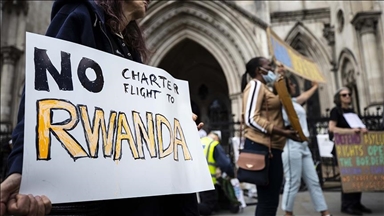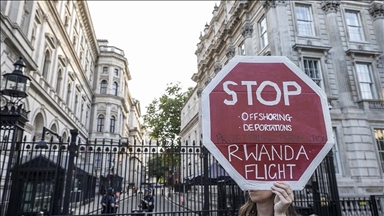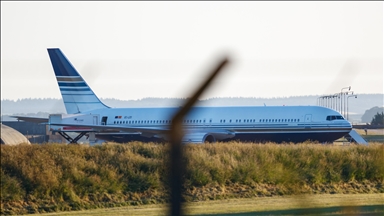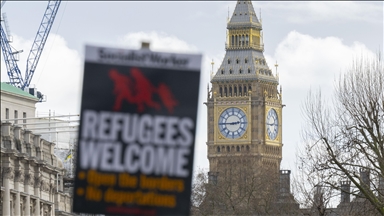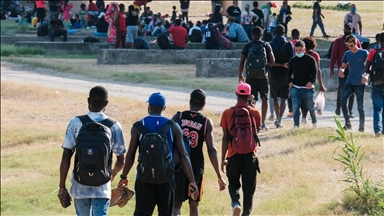Rwanda steps up efforts to beat coronavirus
Government takes several measures to control spread of virus

KIGALI, Rwanda
Rwanda has taken several measures to curb the spread of the novel coronavirus as the number of confirmed cases rose to 11 since March 14, when the first case was announced.
The latest measure came into force at midnight March 20 and it suspends arriving and departing commercial flights for an initial period of 30 days, which also affects national carrier RwandAir.
Initially, the government announced the temporary shutdown of schools, universities, and places of worship for two weeks amid concerns about the spread of COVID-19. Court proceedings and inmates’ visits have also been stopped.
Preparedness
Since the virus first emerged in Wuhan, China in December 2019, the Rwandan government has established a multidisciplinary team to assess and strengthen preparedness and response to the pandemic.
A huge screen used to detect fever among incoming passengers was installed at Kigali International Airport. Passengers undergo mandatory checks and provide information about travel history.
Similar screening goes on at all Rwanda’s borders.
Health and safety measures have also been scaled up to help prevent the spread of the virus, including urging citizens to avoid shaking hands and close body contact such as hugging, covering one’s mouth and nose when coughing or sneezing in public and refraining from unnecessary travel.
The government will spare no effort to protect citizens, said Minister of Health Dr. Daniel Ngamije.
The government has developed a testing capacity and the public should remain calm and observe health and safety measures to help prevent the spread of the virus, he added.
Ngamije also called on citizens to ensure regular washing of hands with soap, limit unnecessary movements and avoid large gatherings.
Dr. Jose Nyamusore, the division manager for surveillance and response at the Rwanda Biomedical Center, said 500 health care workers, including lab technicians from hospitals across the country, have been trained on the coronavirus response.
All hospitals were asked to set up isolation areas where patients suspected of having COVID-19 can be attended to away from other patients.
Preventive measures are also in place to protect health care workers in the line of duty, he said.
Social distancing measures
Generally, handshakes and hugs are a common practice in Rwanda, meaning the idea of social distancing due to COVID-19 did not initially go well.
But as the number of cases grows, people have come to understand the seriousness of the matter.
Rwandan President Paul Kagame popularized the elbow bump as a safe way of greeting when he met American philanthropist Howard Buffett at a recent public function in the country.
The Catholic Church, which constitutes up to 80% of the Rwandan population, has also discarded its “peace greeting” involving handshakes.
It also discarded the practice of receiving bread on the tongue during the celebration of the eucharist.
“During the Eucharist, Christians should now pick bread with their hands, never with the tongue,” said Antoine Kambanda, the Archbishop of Kigali.
The Catholic Church also banned the use of a common vessel containing holy water for purification, in which the faithful dipped their hands at the entrance before entering the church.
The church emptied the vessels as a measure of precaution.
All public places such as banks, markets, hospitals, and bus parks have adopted extraordinary measures to ensure hygiene, with hand washing and sanitizing dispensers put in place.
All these measures were taken in the best interests of Rwandans’ health and safety, said Ngamije.
Anastase Shyaka, a local government minister, said everything is being done to ensure the continuity of essential government services regularly sought by citizens through the use of online portals while ensuring they are safe.
Silver lining
The virus has opened a window of opportunity for some businesses dealing in soap, disinfectants, sanitizers and washes tabs.
A manufacturer of Akambere Portable Hand Washing Sinks in Kigali, was almost out of business but recently has seen a boom in sales after sinks became a necessity amid the virus outbreak.
This month alone, the manufacturer reported sales of more than 1,000 sinks with each costing about $94.
The main customers are hospitals, malls, and restaurants.
Prices of hand sanitizers in Kigali have also doubled from $2 to $4 as a result of increased demand.
“We strategically had to increase the stock of hand sanitizers instead of other household products, because this is one opportunity for good business,” says Emmanuel Bizimana, a Kigali trader.
Dark clouds
Tourism is one of Rwanda’s revenue sources. Rwanda targets $800 million from tourism by 2024 from $438 million in 2017.
The country had this year projected to generate $88 million from about 147 international conferences under the Meetings, Incentives, Conventions, and Exhibitions (MICE).
Nelly Mukazayire, the chief executive of Rwanda Convention Bureau, which promotes the country as a preferred destination, says about 20 meetings which had been scheduled in March and April were indefinitely postponed.
We count it as a loss, these meetings were expected to generate $8 million, about 10% of the projected revenue from MICE this year, she said on Rwanda National Television.
Other stakeholders cry foul
Following the COVID-19 outbreak, several tourists canceled bookings, leaving tour operators and other stakeholders counting losses.
Anaclet Karangwa, the chairperson of cultural tourism companies in Rwanda, has for the last nine years organized the Nyungwe marathon -- an annual event that gathers more than 700 participants from Africa and Europe.
This year’s marathon attracted fewer participants leading organizers to register a loss of $200,000.
Organizers handed out just 300 medals instead of 600 because they could not import from China.
“We had to use local firms to produce the medals but the order was above their capacity, meaning they couldn’t supply on short notice after flights to and from China were canceled,” Karangwa says.
Easing economic impact
Rwanda’s central bank announced Wednesday a series of measures to mitigate the economic impact of the virus.
These include introducing the extended lending facility of roughly $52 million which commercial banks with liquidity challenges can borrow from at the central bank rate and lowering reserve requirement ratio effective April 1 from 5% to 4% to allow banks more liquidity to support affected businesses.
The bank also allowed banks to restructure outstanding loans of borrowers facing temporary cash flow challenges arising from the pandemic.
Global figures
The virus emerged in Wuhan, China, last December, and has now spread to more than 171 countries and territories around the globe.
The World Health Organization has declared the outbreak a pandemic.
According to data provided by Johns Hopkins University, there were more than 307,000 confirmed cases and excess of 13,000 deaths around the world, and more than 92,000 patients have recovered by Sunday.
Anadolu Agency website contains only a portion of the news stories offered to subscribers in the AA News Broadcasting System (HAS), and in summarized form. Please contact us for subscription options.


